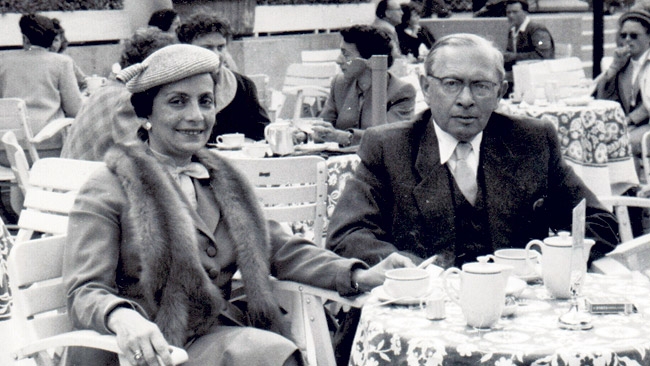Films That’ll Leave You Verklempt
Whether they’re happy tears or tearjerker-induced, the seven films at this year’s Jewish Film Festival are incredibly moving. A few dramatic feature films, a couple of documentaries, a couple of films based on true stories … all are portrayals of life in flux, of transformation – of people, against all odds, connecting and flourishing in the face of adversity.
Foreign Letters (2012), based on a real-life 1980s friendship formed between an Israeli girl and a Vietnamese girl, will suit a Hawaii audience particularly well. The two, newly arrived in the U.S., find solace in each other’s company as they navigate their new surroundings. Director Ela Thier classically captures the joys and pitfalls of adolescence, from sharing secret codes, prank calls and ice skating escapades to first crushes, secrets, sleepovers and the world-ending devastation of that first big argument with your best friend.
Another truth-based feature, Remembrance (2011), takes the viewer down a very different road, with a love affair carrying on in full force despite the atmosphere of starvation, beatings and spirit-dampening bleakness of a concentration camp. Tomasz, a non-Jewish prisoner, runs a small black market ring, bribing guards to turn a blind eye while he trysts with Jewish Hannah. In flashbacks, Hannah, now living in the U.S. with a husband and daughter, begins reflecting on the beautiful intensity of her love with Tomasz – one that drove him to break her out of the camp. In the following turbulence, the two are forever separated. Now, these 30 years later, she discovers that Tomasz still may be alive. A haunting, handsome, pulse-pounding film.
Also set in World War II is My Best Enemy (2011). Victor Kaufmann, the Jewish son of a wealthy family of art collectors, is arrested when his best friend turns on him to join the Nazi cause. The rank-climbing Nazi proceeds to steal Kaufmann’s home and his girlfriend in this entertaining, suspenseful, art heist caper. At one point, the Jew and the Nazi are literally thrust into each other’s shoes to nail-biting effect. Full of twists, the film centers around a rare sketch by Michelangelo.
Fast forward to the present day with A Bottle in the Gaza Sea (2011), wherein an intellectual French teen, newly living in Israel, throws a message-in-a-bottle into the ocean. A Palestinian youth finds the message, and the French girl and Arab boy begin emailing each other, with a touch of hostility at first, that slowly buds into curiosity and even friendship, albeit one fraught with danger and impossibility. Bottle‘s characters – the two youths, their parents, their friends – raise a great many troublesome questions from every side of the Middle East-Israel dilemma. Distance separating them, a computer screen mediating their communication, customary face-to-face judgement is suspended as Tal and Naim’s idealism and growing attraction ignite a hopeful spark in their missile- and hate-torn environment. Note director Thierry Binisti’s excellent cinemato-graphic juxtaposition of the two cultures.
A family’s own intense dysfunction is at the heart of Mabul (The Flood, 2011). A lovely-to-look-at mom and her all too precocious son encounter such wrenching duress that you wonder how they can keep going. An inner resolve propels the pair as they deal with a stoner dad and a mentally disabled older son. A closeup of the dad, smoke flowing from his joint, the yellow airplane that he’s supposed to be piloting reflected in his sunglasses soaring through the sky is unforgettable, as is an incredibly tender moment when the younger brother connects with his older brother, gentle fingers caressing the other’s face. Yoram Toledano, star of popular TV series Prisoners of War, makes a cameo as the man the mom is bedding when her kindergarten duties end for the day.
Dolphin Boy (2012) is another boy-in-turmoil film, but this one is a documentary. After Morad is beaten up by a group of boys, he becomes catatonic. A therapist recommends unusual methods in the form of swimming with dolphins as a stage in helping the boy reconnect with humans. This Arab family, living in Israel, expresses an evocative depth of emotion we’re not accustomed to in the West that is at once foreign and powerful. The boy does gradually adjust in this coming-of-age story wrought with dreamy, cosmic visuals of Morad freediving in the dark-blue sea beside graceful dolphins and myriad bright orange fish.
The Flat (2011), also a documentary, follows Arnon Goldfinger as he searches through his grandmother’s Israel apartment after her death. He finds fascinating bits and clues of a World War II history that associates the high society Jewish-German woman with one of the most notorious Nazi administrators in history. Why would any self-respecting Jewish woman maintain a friendship with such a monster, especially once the war had ended and his atrocities came to light? Arnon embarks on a quest across continents, delving into a pastiche of family history to find out.
the TICKET stub
JEWISH FILM FESTIVAL
When: March 2-14
Where: Doris Duke Theatre (901 Kinau St.)
Cost: $10 per screening, or $60 for a festival flash pass to all seven screenings
More Info: 532-8700, honolulumuseum.org
Photos courtesy of the Honolulu Museum of Art Doris Duke Theatre and the Temple EmanuEl Kirk Cashmere Jewish Film Festival






